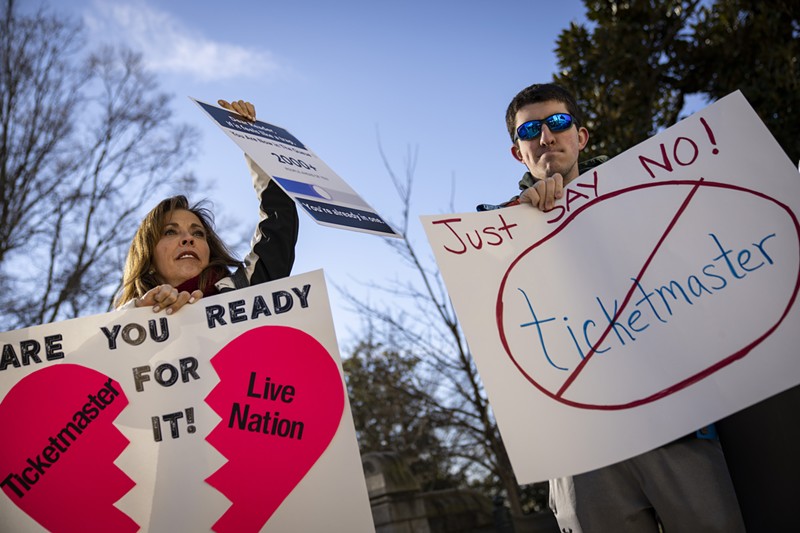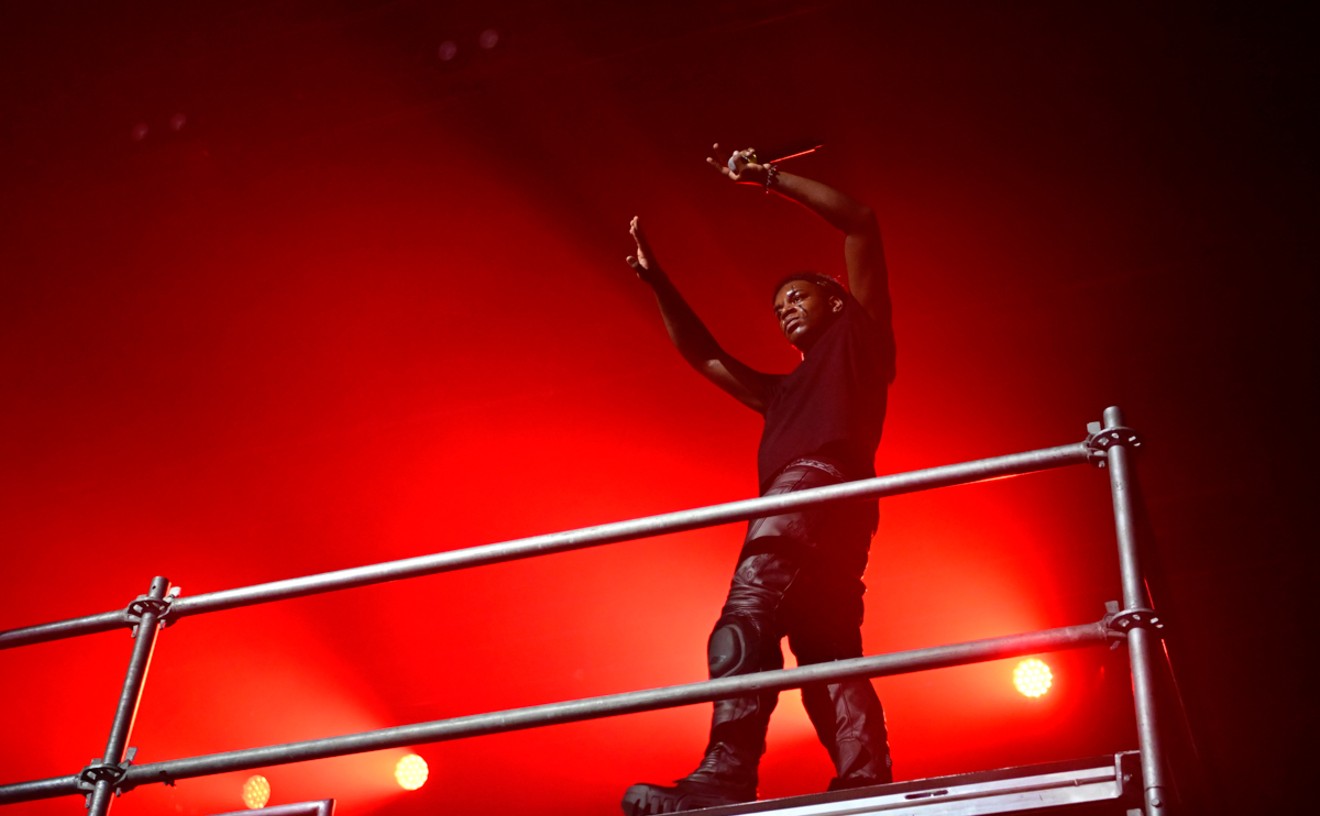Last week, news broke that the U.S. Department of Justice was going forward with a lawsuit against Live Nation Entertainment, the international concert promoter and owner of the ticketing site Ticketmaster, for engaging in practices that ensured it maintained a stronghold over all aspects of its business, particularly the live music scene and everything that encompasses it — basically, a monopoly.
Of course, this was precisely what was predicted would happen when Live Nation and Ticketmaster merged in 2010, a union that many regulators and music industry personnel warned against. However, the Justice Department cleared under certain conditions, like not allowing Live Nation to retaliate against venues that choose competing ticketing sites, which are hard to enforce.
South Florida hasn't escaped Live Nation's reach. The area is similar to most of the U.S., where Ticketmaster is used mainly by arenas, amphitheaters, performing arts centers, and established venues, while smaller spots and nightclubs often opt for smaller ticketing sites. (Sites like Eventbrite, Tixr, Dice, and Shotgun mostly service Miami's clubs and smaller venues.)
Live Nation does have a hand in operating local venues, including FPL Solar Amphitheater and the Fillmore in Miami-Dade, Revolution Live in Fort Lauderdale, and iThink Financial Amphitheater in West Palm Beach. It also has invested in homegrown music festivals like III Points and Rolling Loud, though it's unclear to what degree. Insomniac, of which Live Nation owns a stake, is also a partner in Club Space.
"I think it's fantastic news," says Laura Quinlan, program director for the Rhythm Foundation, about the DOJ's lawsuit. "Most venues have a contract with a ticketing site, and Ticketmaster's is particularly onerous."
Rhythm Foundation manages the Miami Beach Bandshell for the City of Miami Beach, and Quinlan believes the organization holds one of the oldest Ticketmaster contracts in the state, dating back to its foundation in 1988. "We signed a contract with Ticketmaster when we first came out, and we would never use Ticketmaster at our venue," she adds. The local concert promoter is also a charter member of the National Independent Venue Association (NIVA), which pushed for the Justice Department to sue Live Nation.
Ticketmaster's stronghold on event ticketing has also frustrated fans, most famously Swifties, who brought to light the problems with the current system after many attempted — and failed — to buy tickets for Taylor Swift's immensely popular Eras Tour. Complaints ranged from exorbitant fees tacked onto already expensive tickets, a dynamic-pricing model that treats ticket prices like Uber's surge pricing — the more in demand a ticket is, the more expensive it gets — and the reselling of tickets, with accusations that Live Nation profited from the practice.
However, hidden fees continue to be one of the concertgoers' biggest gripes. In some instances, the fees can be higher than the ticket price itself, as many fans of the Cure found out last year when $20 tickets were subjected to a service fee of $11.65, a facility charge of $10, and an order processing fee of $5.50. Frontman Robert Smith demanded Ticketmaster refund the band's fans some of the service fees, which the company utlimately agreed to.
Years ago, some fees could be avoided if you took time out of your day to purchase tickets directly from a venue's box office. However, in the age of the internet, that practice is virtually nonexistent.
According to Quinlan, that's why Rhythm Foundation uses Dice as its ticketing site of choice. The price you see listed for any event on Dice's site already includes fees and tax. "One of the things we liked about Dice is their transparency and their commitment to a fan experience where they don't feel like they're getting ripped off," she explains. "They keep their facility and processing fees to a reasonable level."
More competition in the concert space will benefit not only fans but also smaller ticketing sites like Dice, Tixr, and Shotgun. These sites have carved a niche for themselves in Miami, mainly handling nightlife events, midsized festivals, and smaller concerts.
Shotgun, a Paris-founded ticketing site, was introduced into the Miami market during the pandemic. It's already one of France and Brazil's largest independent ticketing sites and is quickly expanding into North America.
"This was a long time coming and necessary to allow for a more competitive and freer market," says Charlie Levy, Shotgun's senior marketing manager for North America, based out of Miami. "Especially for larger venues to work with a variety of ticketing platforms and for independent promoters to feel strong-armed by Live Nation to use Ticketmaster when using those venues."
Levy says smaller ticketing sites like Shotgun were born out of Ticketmaster dominance and ignoring independent promoters.
If the lawsuit is successful, the concert industry could be reshaped in new and interesting ways. For example, imagine an artist having the freedom of choosing a ticketing site for their entire tour, irrespective of the venue's preference.
In addition to the Justice Department's move, the U.S. House passed the Transparency in Charges for Key Events Ticketing (TICKET) Act last month with broad bipartisan support. The act guarantees refunds if an event is canceled or postponed and bans the practice of "speculative ticketing," where resellers sell tickets they have yet to purchase themselves. It all requires an "all-in pricing" for tickets. The act must now move through the Senate before President Joe Biden can sign it into law.
.
[
{
"name": "Air - MediumRectangle - Inline Content - Mobile Display Size",
"component": "19274298",
"insertPoint": "2",
"requiredCountToDisplay": "2",
"watchElement": ".fdn-content-body",
"astAdList": [
{
"adType": "rectangle",
"displayTargets": "mobile"
}
]
},{
"name": "Editor Picks",
"component": "17482312",
"insertPoint": "4",
"requiredCountToDisplay": "1",
"watchElement": ".fdn-content-body",
"astAdList": [
{
"adType": "rectangle",
"displayTargets": "desktop|tablet"
},{
"adType": "rectangle",
"displayTargets": "desktop|tablet|mobile"
}
]
},{
"name": "Inline Links",
"component": "18711090",
"insertPoint": "8th",
"startingPoint": 8,
"requiredCountToDisplay": "7",
"maxInsertions": 25
},{
"name": "Air - MediumRectangle - Combo - Inline Content",
"component": "17482310",
"insertPoint": "8th",
"startingPoint": 8,
"requiredCountToDisplay": "7",
"maxInsertions": 25,
"watchElement": ".fdn-content-body",
"astAdList": [
{
"adType": "rectangle",
"displayTargets": "desktop|tablet"
},{
"adType": "rectangle",
"displayTargets": "desktop|tablet|mobile"
}
]
},{
"name": "Inline Links",
"component": "18711090",
"insertPoint": "8th",
"startingPoint": 12,
"requiredCountToDisplay": "11",
"maxInsertions": 25
},{
"name": "Air - Leaderboard Tower - Combo - Inline Content",
"component": "17482313",
"insertPoint": "8th",
"startingPoint": 12,
"requiredCountToDisplay": "12",
"maxInsertions": 25,
"watchElement": ".fdn-content-body",
"astAdList": [
{
"adType": "leaderboardInlineContent",
"displayTargets": "desktop|tablet"
},{
"adType": "tower",
"displayTargets": "mobile"
}
]
}
]












